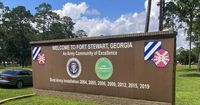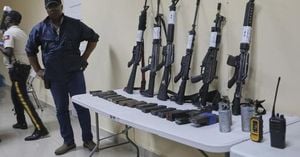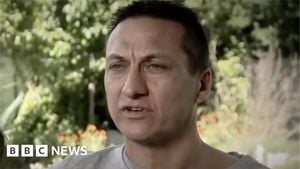On the morning of August 6, 2025, the sprawling grounds of Fort Stewart in southeast Georgia—normally a bastion of discipline, routine, and camaraderie—were jolted by violence that left five soldiers wounded and a community grappling with shock. The shooter, later identified as Sgt. Quornelius Radford, 28, was swiftly subdued and arrested by his peers, preventing what could have been an even more devastating tragedy. According to The Associated Press, the incident unfolded just before 11 a.m. in the area of the 2nd Armored Brigade Combat Team, a unit known as the "Spartan Brigade," which the Army touts as its "most modern land fighting force."
Fort Stewart, located about 40 miles southwest of Savannah, is the largest Army post east of the Mississippi River. Home to the 3rd Infantry Division and thousands of soldiers and their families, the installation is a linchpin of military life and the regional economy, contributing an estimated $4.9 billion annually, as reported by the U.S. Army. On that Wednesday, however, the fort’s daily rhythms were shattered by gunfire and the abrupt lockdown that followed.
Eyewitness accounts and official statements paint a harrowing picture. Sgt. Aaron Turner, who was working nearby, recalled to The Atlanta Journal-Constitution that he was helping secure the post when he encountered Radford, whom he recognized. Radford, wearing a hoodie over his uniform and carrying a Glock pistol, told Turner, "go home" and insisted the shooting "had nothing to do with Turner or other soldiers"—that "it was pretty much leaders" he was after. As Radford tried to reload, Turner grabbed the barrel and kept the weapon pointed at the ground until other soldiers could help restrain him. Turner’s quick thinking, along with the actions of five other soldiers, was later recognized with a Meritorious Service Medal.
In the aftermath, the Army confirmed that the five wounded soldiers were in stable condition and expected to survive. Three were released from hospitals that same day. One remained at Winn Army Community Hospital at the post, while another was still being treated at Memorial Health University Medical Center in Savannah the following day. Brigadier General John Lubas, commanding general of the 3rd Infantry Division, told reporters that the soldier at Winn hospital was "doing very well" and might be released as early as the weekend. The soldier in Savannah was also expected to recover, though her path would take longer. "Doctors are very positive," Lubas said, according to The Atlanta Journal-Constitution.
The incident prompted an immediate lockdown of parts of Fort Stewart, including its three elementary schools, which collectively serve nearly 1,400 students. Three schools outside the base followed suit "out of an abundance of caution," the Liberty County School System announced. A post on Fort Stewart’s Facebook page urged personnel in the affected areas to "stay inside, close and lock all windows and doors." The lockdown lasted about an hour, after which normal operations gradually resumed.
Radford, an automated logistics sergeant assigned to the 2nd Armored Brigade Combat Team, was booked into Liberty County Jail in Hinesville. The U.S. Army Criminal Investigation Division indicated he would likely be transferred to a military detention facility. Public records revealed that Radford had enlisted in January 2018 and had not been deployed. He also faced an upcoming hearing on unrelated traffic charges, including driving under the influence and running a red light in May 2025.
As details emerged, so did questions about Radford’s motives and mental state. His father, Eddie Radford of Jacksonville, Florida, told The New York Times that his son had been seeking a transfer and had complained to family members of racism at Fort Stewart, where he had served for several years. He also described Radford as having struggled with depression, particularly after the death of his mother during his childhood. On the morning of the shooting, Radford sent a text message to his aunt, saying he loved everyone and "that he’ll be in a better place because he was about to go and do something." Despite these warning signs, his father said Radford had no history of serious mental health issues.
Military officials confirmed that Radford had used a personal handgun, not a military-issued weapon. Asked about screening for such weapons at base entrances, U.S. Army Secretary Dan Driscoll told reporters, "We absolutely will want to learn from this investigation. We do not want something like this to ever happen again on an Army base. If there are things to do to improve safety, we will take those steps." The FBI was called in to assist with the investigation, reflecting the gravity of the incident and the broader concerns it raised about security on U.S. military installations.
For those who responded to the crisis, the experience was both traumatic and a testament to their training. Staff Sgt. Melissa Taylor, one of the six soldiers honored for their actions, described to The Atlanta Journal-Constitution how she rushed to aid a wounded comrade, applying pressure to a gunshot wound with her bare hands. "I had no medical supplies or anything with me … I had my bare hands. I was covered in blood up to my elbows on both arms. There was no time for you to stop and put on gloves in a situation like that," Taylor recounted. Another honoree, 1st Sgt. Joshua Arnold, said, "It was training that kicked in. You just go to work."
Dr. James Dunne, chief of trauma services at Memorial Health University Medical Center and a former military emergency physician, praised the rapid response of the base’s personnel. "The military wrote the book on Triple C, or tactical combat casualty care," Dunne told The Atlanta Journal-Constitution. "There’s no better group of people you want taking care of you, if you’re shot, than pre-hospital military people."
The shooting at Fort Stewart is the latest in a string of violent incidents at U.S. military bases over the past two decades, including high-profile attacks at Fort Hood, the Washington Navy Yard, and Naval Air Station Pensacola. Each has prompted renewed scrutiny of base security and the challenges of preventing violence within the armed forces’ own ranks.
Georgia Governor Brian Kemp and U.S. Representative Buddy Carter both monitored the situation closely, expressing support for the ongoing investigation and for the Fort Stewart community. President Donald Trump, speaking to reporters at the White House on August 6, called the shooter a "horrible person." The episode has reignited debates about safety, mental health, and the stresses faced by service members—issues that, while not new, demand continued attention and action.
As Fort Stewart’s soldiers and families begin to heal, the quick and selfless actions of those who intervened serve as a powerful reminder of the courage and resilience that define military life, even in the face of unexpected tragedy.




